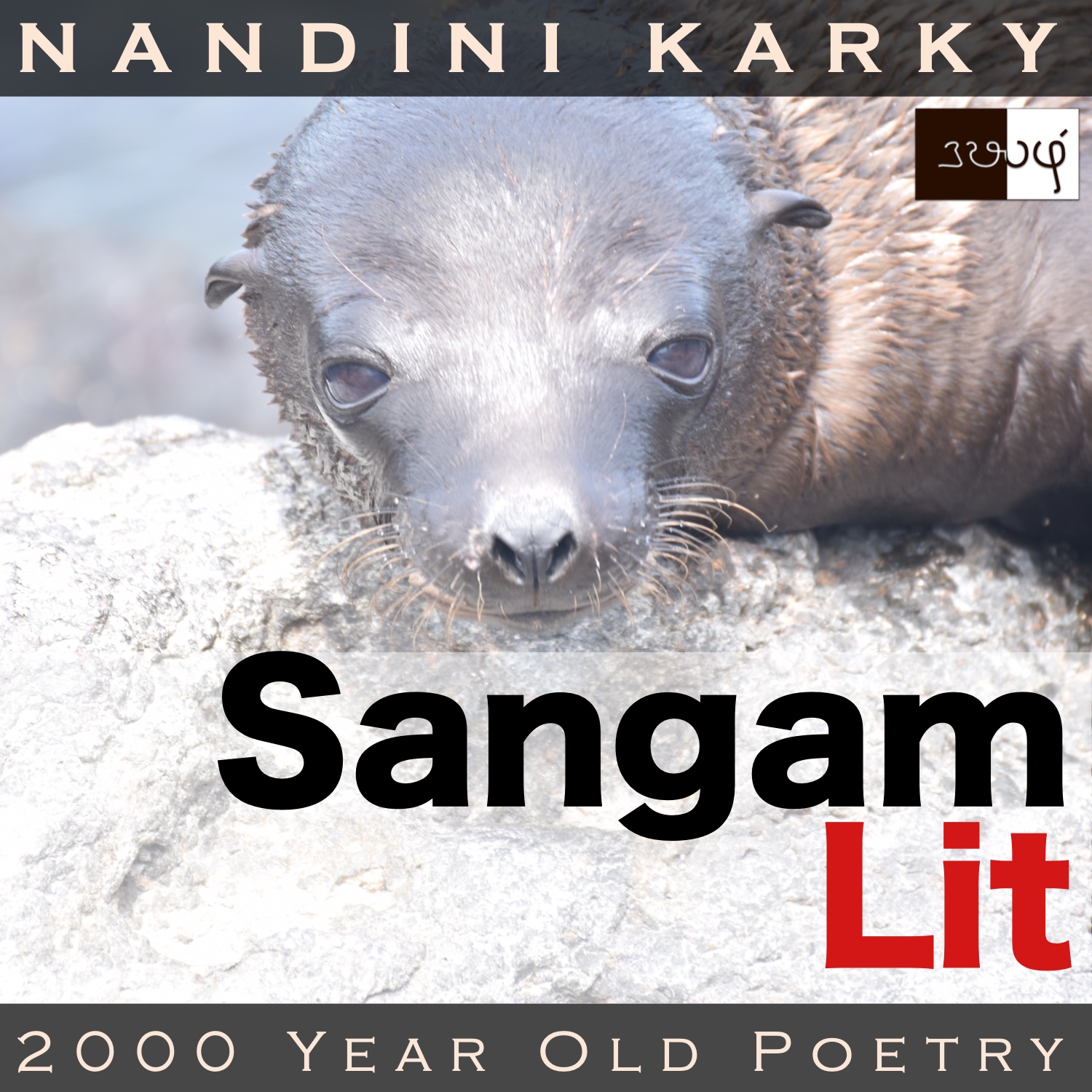Podcast: Play in new window | Download
Subscribe: Apple Podcasts | Spotify | Amazon Music | Android | iHeartRadio | Email | TuneIn | RSS | More

In this episode, we perceive envy and quarrel over a man, as portrayed in Sangam Literary work, Kurunthogai 364, penned by Avvaiyaar. The verse is situated in the farmlands of ‘Marutham’ and speaks in the voice of a courtesan, passing on a pointed message to the friends of another courtesan.
அரில் பவர்ப் பிரம்பின் வரி புற நீர்நாய்
வாளை நாள் இரை பெறூஉம் ஊரன்
பொன் கோல் அவிர் தொடித் தற் கெழு தகுவி
எற் புறங்கூறும் என்ப; தெற்றென
வணங்கு இறைப் பணைத் தோள் எல் வளை மகளிர்
துணங்கை நாளும் வந்தன அவ் வரைக்
கண் பொர, மற்று அதன்கண் அவர்
மணம் கொளற்கு இவரும் மள்ளர் போரே.
‘The day that makes it all clear is here’ is the core thought in this verse. The opening words ‘அரில் பவர்ப் பிரம்பு’ meaning ‘coiled leaves of the cane’ bring to fore, a wild grass also known as ‘rattan’ used to make lightweight, weather-resistant furniture in modern times. Following the flora, appears ‘வரி புற நீர்நாய்’ meaning ‘the otter with a lined back’. Accompanying the otter, arrives ‘வாளை நாள் இரை’ meaning ‘the daily prey of scabbard fish’. A flow of information is indicated by the phrase ‘எற் புறங்கூறும் என்ப’ meaning ‘they say she speaks ill of me behind my back’. Who is saying what to whom will become clear shortly! ‘துணங்கை நாளும் வந்தன’ meaning ‘the day of dancing together is here’ reveals a social ritual in Sangam times. Ending with the words ‘மள்ளர் போரே’ meaning ‘the fight of warriors’, the verse welcomes us to learn more.
Nature on one side, in the images of otters and scabbard fish, and culture, on the other, with ‘thunangai’ dance and ‘mallar’ fight. The context reveals that the man was in a relationship with a courtesan and this courtesan seems to have incurred the envy and wrath of another courtesan. The second courtesan had spoken disparagingly of the first, saying she had cornered the man. When the first courtesan hears of this, she decides to pass on a message to that slandering speaker. One day, when the friends of the second courtesan are close by, the first courtesan says, “With a lined back, akin to matted cane grass, the otter seeks and finds the scabbard fish as its prey at dawn in the town of the lord. Wearing thick, rounded and radiant bangles, that worthy woman speaks ill of me behind my back, they say. The day to make things clear has come. This is the day when maiden with slender, curving wrists and thick, bamboo-like arms, wearing glowing bangles come together for the ‘thunangai’ dance. In that same place, with flashing eyes, seeking to dance together with the women they wish, starts the battle of the brave!” With these words, the first courtesan conveys that she is the preferred one for the man, who seeks her out on his own accord.
From the translation, it’s hard to perceive the intricacies of this one. So, let’s delve into the courtesan’s words and unearth the deeper meaning. She starts by describing the town of the man as a place where otters live. To vividly capture these animals, the courtesan says how the backs of these otters are just like the tangled leaves of the cane grass. After that apt plant-animal simile, the courtesan delves into the daily habits of this creature and the way it seeks out and captures scabbard fish as its prey at the break of dawn. Completing the description of the man’s town thus, the courtesan continues by mentioning how some people have brought to her, the words of ill-will of the other courtesan. In response to that, this courtesan just says one phrase – ‘Everything is going to become clear’. When we ask her ‘when’, she says that will happen on the day of the ‘thunangai’, when bedecked, beautiful maiden dance together, and also, when men come there, with eyes waging a silent war, and then go on to indulge in a louder fight, so as to win the maiden they seek!
What the courtesan means is that on the day of the ‘thunangai’ dance, it will become clear for all wagging tongues to see that the man prefers only her, for she believes he will seek her out, fight for her, and dance with her, thus proving his affections for her, without a doubt! In the scene of the otter seeking the scabbard fish, the courtesan places a metaphor for how she, like the scabbard fish, did not corner the man and keep him for herself, as the second courtesan accuses, but, the man, like the otter, sought her out on his own. Although the courtesan presents this capture by the man as a positive thing, in the end, like that scabbard fish, she too is a prey to the system that glorifies the man and his wealth. Yet another song from the agricultural regions that clearly demonstrates the accumulation of wealth, unequal distribution of power, and most of all, the supremacy of patriarchy, in those times. A moment to pause and feel positive about the distance some women in some places have come since then, and also, be inspired to go on, so as to eliminate this unjust system from the face of the earth!




Share your thoughts...